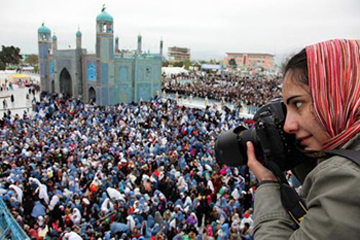Telling the story at a price
When war breaks out, most non-combatants run the other way. But a
handful of courageous reporters see it as their duty to tell the world
what's happening on the ground. And many pay a high price. Since 1992,
1,129 journalists have been killed on the job, 38 percent of them in war
zones, according to figures compiled by the New York-based Committee to
Protect Journalists (CPJ). And increasingly, they are being deliberately
targeted.
 |
|
(Al Jazeera) |
In an explicit recognition of the key role of the media in peace and
security, the UN Security Council recently unanimously adopted a
resolution condemning all violations and abuses committed against
journalists and deploring impunity for such acts.
"Recent killings of journalists have been given extensive and welcome
attention around the world, including the brutal murders of Western
media representatives in Syria," said UN Deputy Secretary-General, Jan
Eliasson.
"Yet we must not forget that around 95 per cent of the killings of
journalists in armed conflict concern locally-based journalists,
receiving less media coverage," he added.
Syria remains the deadliest place for journalists, with at least 80
killed there since the conflict erupted in 2011. The second and third
places in journalist deaths were shared by Iraq and Ukraine.
According to CPJ, about one quarter of the journalists killed last
year were members of the international press, double the proportion the
group has documented in recent years. Christophe Deloire, Director
General of the Paris-based Reporters Without Borders, said that, "It's
historic that the Security Council should make a link between the right
to freedom of expression and the need to protect journalists, even
though it may seem obvious."
But Deloire noted that hundreds of journalists have been killed since
the last resolution was adopted in 2006 - 25 this year alone - and "as
excellent as it may be, there is no certainty that a new resolution will
in and of itself be enough to resolve the problem."
"I envision a normal country where journalists won't need bulletproof
cars and bodyguards and will not need any protection," said Santos,
himself a former journalist and one-time president of the freedom of
expression commission for the Inter-American Press Association.
"But for now, we need to make sure that the programme is properly
funded and effective," he added.
Launched in 2011, the journalist protection program provides
protection for around 7,500 at-risk people, including human rights
activists, politicians and journalists, at a total cost of US$ 600,000
dollars per day.
Colombia ranked eighth on CPJ's 2014 Impunity Index, which spotlights
countries where journalists are slain and their killers go free.
Iraq ranked number one, followed by Somalia, the Philippines, Sri
Lanka, Syria, Afghanistan and Mexico.
At the Security Council meeting, Deloire from Reporters Without
Borders called for the creation of a Special Representative of the
Secretary-General for the protection of journalists in order to increase
the prominence of the issue within the UN system. He stressed that a
staggering 90 percent of crimes against journalists go unpunished."Such
a high impunity rate encourages those who want to silence journalists by
drowning them in their own blood," Deloire said. (IPS)
|

